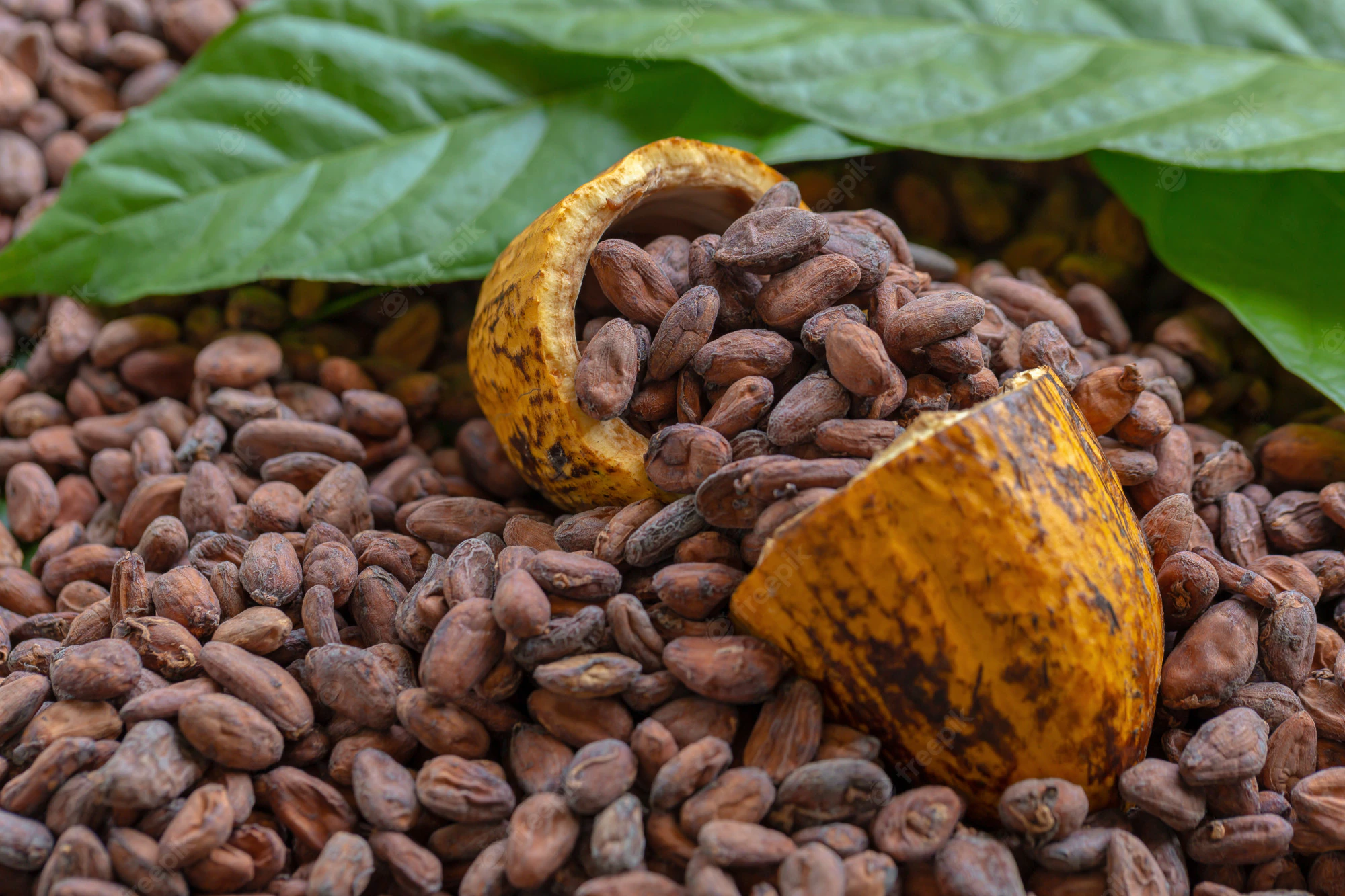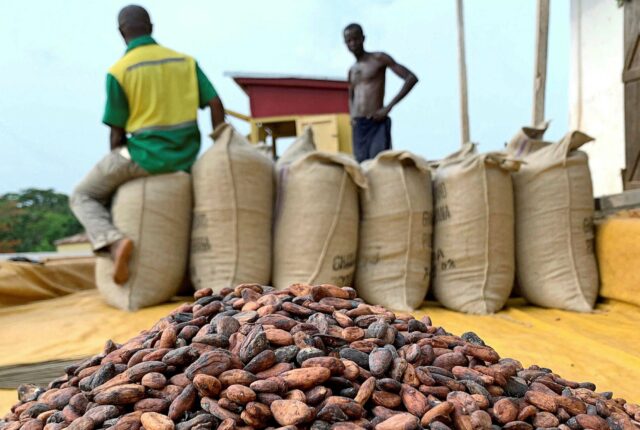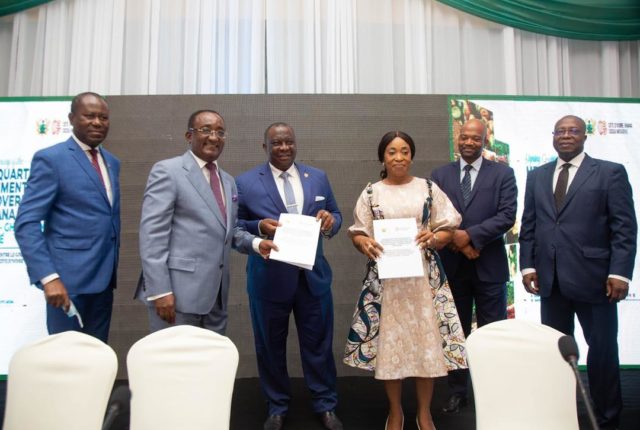
Côte D’Ivoire and Ghana meet under their Joint Initiative to fine-tune Cocoa Traceability Plans and Standards
Côte D’Ivoire and Ghana meet under their Joint Initiative to fine-tune Cocoa Traceability Plans and Standards
Côte d’Ivoire and Ghana are meeting under the auspices of the Côte d’Ivoire-Ghana Cocoa Initiative (CIGCI) in Abidjan this week to take stock of the implementation of the African Regional Standard (ARS-1000) and their separate traceability systems and fine-tune this key element in ensuring farmers receive the remuneration they deserve.
The two-day workshop being attended by representatives of Cote d’Ivoire’s regulator, Le Conseil du Café-Cacao, and the Ghana Cocoa Board (Cocobod), will share progress on their traceability systems and deliberate on among other things, the cost of implementation, the use of the African Standard, ARS-1000 and complying with the European Union Deforestation Regulation that comes into force at the end of 2024.
ARS-1000 is an African Regional Standard focused on sustainable cocoa production. It will allow companies sourcing from countries such as Côte d’Ivoire and Ghana to benefit from proof of compliance with the ARS-1000 standard. It would therefore de facto add to the credibility of their due diligence, and add an additional layer of transparency. For Ivorian and Ghanaian cocoa, respectively 67% and 47% of which is currently destined for the EU, our ambition with the implementation of the ARS-1000 is to ensure ease of access to the European market while assuring higher incomes for our farmers.
“We’re going to also look at best practices of other regions to see where we can improve and make things simpler for our farmers – who are at the heart of our strategy,” said CIGCI Executive Secretary, Alex Assanvo. “Consumers are demanding more transparency, traceability and certification from us because the world is becoming more sustainable – which is also a priority for our member countries,” Assanvo said.
The joint country workshop comes off the back of ongoing expert technical working groups being facilitated by the CIGCI to build an Economic Pact for Sustainable Cocoa – part of its strategic vision towards a more sustainable price mechanism in the long term, and ultimately a more equitable income for farmers. The second Technical Working Group on Traceability has held several virtual and in-person meetings between the countries, cocoa and chocolate companies and civil society, in recent weeks. It follows the work of the Technical Working Group on Price and Markets that provided a set of recommendations earlier this year.
La Côte D'ivoire Et Le Ghana Se Rencontrent Dans Le Cadre De Leur Initiative Commune Afin D’ajuster Les Plans Et Normes De Traçabilité Du Cacao
La Côte d’Ivoire et le Ghana se réunissent sous l’égide de l’initiative Côte d’Ivoire-Ghana pour le cacao (CIGCI) à Abidjan cette semaine pour faire le point sur la mise en œuvre de la Norme Régionale Africaine ARS-1000 et sur leurs systèmes de traçabilité respectifs, et pour ajuster cet élément clé afin de garantir aux producteurs la rémunération qu’ils méritent.
L’atelier de deux jours auquel participent des représentants de l’organisme de réglementation de la Côte d’Ivoire, Le Conseil du Café-Cacao, et du Conseil du cacao du Ghana (Cocobod), permettra de partager les progrès réalisés dans leurs systèmes de traçabilité et de délibérer, entre autres, sur le coût de la mise en œuvre, l’utilisation de la Norme Africaine ARS-1000 et la conformité avec le règlement de l’Union européenne sur la déforestation qui entrera en vigueur à la fin de l’année 2024.
L’ARS-1000 est une Norme Régionale Africaine axée sur la production durable de cacao. Elle permettra aux entreprises qui s’approvisionnent dans des pays tels que la Côte d’Ivoire et le Ghana de bénéficier d’une preuve de conformité à la Norme ARS-1000. Elle renforcera donc de facto la crédibilité de leur diligence raisonnable et ajoutera une plus grande transparence. S’agissant du cacao ivoirien et ghanéen, dont 67 % et 47 % respectivement sont actuellement destinés à l’UE, notre ambition, avec la mise en œuvre de l’ARS-1000, est de faciliter l’accès au marché européen tout en garantissant des revenus plus élevés à nos producteurs.
« Nous allons également examiner les meilleures pratiques des autres régions pour voir où nous pouvons nous améliorer et simplifier les choses pour nos producteurs, qui sont au cœur de notre stratégie », a déclaré le secrétaire exécutif du CIGCI, Alex Assanvo. « Les consommateurs exigent de nous plus de transparence, de traçabilité et de certification parce que le monde devient plus durable, ce qui est également une priorité pour nos pays membres », a ajouté M. Assanvo.
L’atelier national conjoint s’inscrit dans le prolongement des groupes de travail techniques d’experts mis en place par le CIGCI pour élaborer un Pacte économique pour un cacao durable, dans le cadre de sa vision stratégique axée sur un mécanisme de prix plus durable à long terme et, en fin de compte, sur un revenu plus équitable pour les producteurs. Le deuxième groupe de travail technique sur la traçabilité a organisé plusieurs réunions virtuelles et présentielles entre les pays, les sociétés de cacao et de chocolat et la société civile au cours des dernières semaines. Cela fait suite aux travaux du groupe de travail technique sur les prix et les marchés, qui a formulé une série de recommandations au début de l’année.
Author
CIGHCIRelated posts
Press Release English : Côte d’Ivoire and Ghana Decide to No Longer Sell Their Cocoa at Origin Differentials Below Zero
Côte d’Ivoire and Ghana have decided to no longer sell their cocoa at origin
Countries scramble to join Cote d’Ivoire-Ghana Cocoa Initiative
Top officials of Ghana and Cote d’Ivoire say they have received calls from
PRESS RELEASE by the Conseil du Café Cacao of Côte d’Ivoire with the support of COCOBOD Ghana, following discussions on Monday 31 October and Thursday 03 November 2022 respectively with the chocolate Manufacturer Mondelez and the Exporters Cargill, Olam, Ecom Trading, Cemoi, Touton, Barry Callebaut and Sucden
PRESS RELEASE by the Conseil du Café Cacao of Côte d’Ivoire with the sup





Leave a Reply